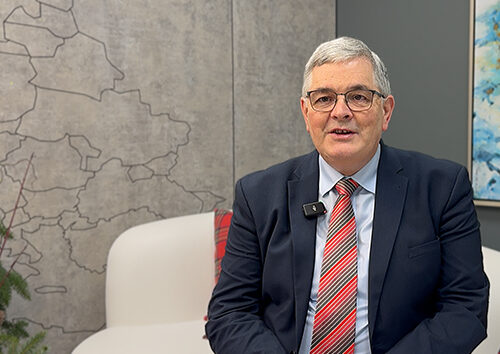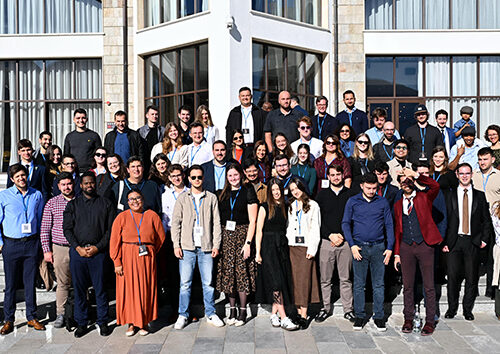12 July 2025 | St Louis, USA [Erton C. Köhler with Adventist Review]
In his second sermon to the delegates and visitors present at the 62nd General Conference Session in St Louis, newly elected president Erton C. Köhler shared a vision for the church based on Matthew 24:4-13. Originally published by the Adventist Review, the following text retains elements of his spoken delivery. A video link of the worship service is included below, beginning at the same point as the written message.
Our Blessed Hope
I would like to invite you now to turn your hearts, ears, and eyes to our blessed hope: the second coming of Jesus. This hope reminds us that “Jesus is not preparing something for us, but He is preparing us for something He has already prepared.”1 The hope the Lord planted in our hearts should fill us with a sense of urgency, but unfortunately, many of us have lost that sense. In reality, “the early Christians expected Jesus to come very soon, our parents expected Him to come soon, and we expect Him to come sometime in the future.”2
We cannot forget that a hopeless world is in desperate need of a hopeful church. As stated by the Swiss theologian Emil Brunner: “What oxygen is for the lungs, such is hope for the meaning of human life. Take oxygen away, and death occurs through suffocation; take hope away, and humanity is constricted through lack of breath; despair supervenes, spelling the paralysis of intellectual and spiritual powers by a feeling of the senselessness and purposelessness of existence.”3
When we think of our blessed hope, one of the most significant quotations from Ellen White says: “The Lord is coming. We hear the footsteps of an approaching God.”4 What a powerful quotation from the Spirit of Prophecy! Every time I read it, I ask myself, How close are these footsteps?
To find the right answer to this question, we need to reflect more deeply on the signs of the second coming of Jesus mentioned in Matthew 24. If we study Matthew 24 with more attention, we will see two groups of signs that encapsulate all the signs of the second coming of Jesus presented in the Bible. I believe we have enough Bible evidence to say that Jesus will come only when both groups of signs occur together.
The first group of signs appears in Matthew 24:4-13, where we can see a world falling dramatically for destruction. We can find a list of tragedies that will happen in the world, including “wars and rumours of wars” (verse 6), “famines, pestilences, and earthquakes in various places” (verse 7), as well as hate, false prophets, and lack of love (verses 9-13). In the Bible we have many other verses about the negative signs of the second coming of Christ showing that this world is falling dramatically toward destruction.
The second group of signs is represented by Matthew 24:14, where we can see a church rising powerfully for mission: “And this gospel of the kingdom will be preached in all the world as a witness to all the nations, and then the end will come.” Matthew 24:14 calls our attention to the gospel of the kingdom being preached to the entire world. We have absolute confidence that soon the present kingdom of Christ’s grace will give place to the future kingdom of His glory, when He appears in the clouds of heaven. What a glorious day it will be!
The hope of the Second Coming is expressed in many prophecies throughout the Bible. This message was entrusted to us, as Seventh-day Adventists, to preach boldly “to those who dwell on the earth – to every nation, tribe, tongue, and people” (Rev. 14:6). Our movement came into existence because of this glorious hope, and it is part of our spiritual DNA. It is expressed in our very name “Adventists,” and it is the core of our fundamental beliefs.
A World in Crisis
We all agree that our world is falling dramatically toward destruction. The negative signs are before our eyes, and you can see them everywhere. I don’t need to say much on this matter, but I would like to highlight at least some of them. Let me call your attention first to the symbolic Doomsday Clock, which appeared for the first time in 1947 in the Bulletin of the Atomic Scientists.5 This clock illustrates how close humanity is to a global catastrophe leading humanity to its self-destruction.
On January 28, 2025, the clock was set at 89 seconds to midnight, which means closer to midnight than ever before since it was created more than 75 years ago.6 In setting the clock one second closer to midnight, the Science and Security Board sent a stark signal: our world is in an extremely dangerous situation, at the very border of a global disaster. And this is not the only indicator that things are not getting better, but rather worse and worse every day.
Unquestionably this is the work of God’s enemy in his untiring attempts to destroy this world. He uses the human agents sowing selfishness, hatred, polarization, betrayal, corruption, and all kinds of degeneration of human personal and social behaviour (see 2 Tim. 3:1-5). He also acts through natural disasters, and we can see the increase of nature’s violence in droughts, fires, and floods. We can see a global crisis in such areas as finances, morality, politics, society, environment, and, unfortunately, even in the religious world.
Ellen White alerts us that “the agencies of evil are combining their forces and consolidating. They are strengthening for the last great crisis. Great changes are soon to take place in our world, and the final movements will be rapid ones.”7 She is talking about great changes happening with increasing urgency. In reality, we have no time to recover from one tragedy, and then the next one is already here. Each one is more devastating than the previous one. This is an accurate picture of our days.
Agents of Hope
All these tragedies, crises, and problems require our attention, our love, our care. We are called to be agents of hope, committed to relieve the suffering of humanity. Our attention cannot be focused on all the negative signs around us. This is not the emphasis of the second coming of Jesus. We can’t spend our time always looking for a tragedy here and another there that could motivate us to be prepared for the second coming of Jesus. Our message is not a message of fear or sensationalism. It is a message based on hope and security, not anxiety or fear (see Luke 21:25-28). We are moved by hope. All the negative signs showing the world falling dramatically are not our priority. The direction the world is taking is not in our hands and does not depend on us.
Our focus is on a church rising powerfully for mission. This is God’s priority, and it needs to be our priority as well. To finish the preaching of the gospel of the kingdom to all the world is the major sign of the second coming of Jesus.
We can easily recognise that the world is falling dramatically toward destruction. But I have a question for us to think about: Is the church already rising powerfully for mission? If we are just an army in a trench, we are already a defeated army. Our church is not called to be a warehouse, but rather a distribution centre. If the power over the direction of this world is not in our hands, the responsibility to raise the church for mission is ours. We have the call, the commission, the promise of the power of the Holy Spirit, and the certainty that Jesus will be with us always, even to the end of the age (see Matt 28:18-20).
Our Commitment
On this very special occasion I would like to invite you, in all your initiatives, to not only deal with the world falling dramatically toward destruction, but to prioritize the raising of the church powerfully for mission. Gottfried Oosterwal reminds us that “mission is the heartbeat of the church. If it stops, the church ceases to be. Each institution, every programme, and any activity of the church has meaning – and the right to exist – only if it participates in mission. . . . No believer, really, can sing in church, ‘Redeemed, redeemed, Redeemed by the blood of the Lamb,’ or pray, ‘Thy kingdom come,’ without thereby binding himself to participate in Christ’s own mission. Nobody can truly say that he belongs to God’s own people unless he serves Christ as a missionary.”8
But if you are not “committed to mission you are like a firefighter who runs into a burning building just to fix a painting on the wall.”9 This should never ever be our condition. But it will end up happening to us if we prioritise what is not our real priority. If we would like to see Jesus coming in the clouds of heaven, this is the time for us as a global church to rise powerfully for mission. This is a call for all of us – our children, our teens, our youth and young adults, our experienced people, our aged ones; for men and women, the deaf, the blind, and all other people with disabilities; for each member, pastor, or leader. It is a call for all areas of the church – for every local church, every organisational level, and each institution.
The church will raise powerfully for mission only if we have a deep commitment to be grounded on the Bible and focused on the mission, praying earnestly for the outpouring of the Holy Spirit in our lives. We desperately need a revival in our personal life and in the life of the church, making us a denomination – a group of people who advance on our knees. We need a reformation that will prepare us to live, not according to our personal opinions, but according to God’s orientation. We want a church that loves, believes, and seeks the guidance of the Spirit of Prophecy, revealed through the prophetic ministry of Ellen White. A church that is ready to use all means for the mission. A church committed to distributing literature, which plays a prophetic role, using the latest technologies to reach people where they are, without barriers, and can communicate the message to the accelerated minds of our days. Indeed, a church that was born in the nineteenth century but is prepared to face the challenges and needs of the twenty-first century.

A church that is ready to be raised powerfully for mission moves forward in an integrated way, recognizing that together we are stronger, we go further, and we arrive faster. A church that promotes unity among the different generations, avoiding silos of isolation. In Ellen White’s own words: “My brethren, allow nothing to come in that will separate you from one another or from God. Talk not of differences of opinion, but unite in the love of the truth as it is in Jesus.”10 Our differences are like musical notes: together, in God’s hands, they can form the most harmonious and beautiful symphony. This does not mean that we will not have differences and problems, but that we will know how to disagree with love, education, and balance, avoiding polarization and strengthening integration.
Our church will be raised powerfully for mission only if mission is the priority of our initiatives, meetings, personnel, and resources. We can’t be distracted by things that are not the real priority of our church. But you know that the more we grow, and the more we increase our structure, and the more complex we become, the greater becomes the risk of drifting away from our sacred mission. This happens when we start celebrating other achievements apart from fulfilling the mission that the Lord has entrusted to us.
Our mission is very clear: to preach the three angels’ messages of Revelation 14:6-12 to the entire world, and this always within the framework of hope. Not with criticism, not with any other kind of negative attitude. The Lord entrusts us with a message to be preached with hope and kindness, because our message is not a message of destruction, but a message of salvation. Destruction is the consequence of not accepting the message of salvation. We can adjust methods, but never change our Bible-based message. Our methods and strategies need to be refocused to reach the most challenging areas and people groups around the globe. We need a mission that promotes a healthy and dynamic growth in quantity, combined with a deep growth in quality.
We can’t be a church that measures its growth by a simple ABC – Attendance, Buildings, and Cash – but one that is strongly committed to the “D” of Disciple-making. We need to be a church that can expand our front doors and close our back doors. A warmer church, which is not focused only on itself, like a club of saints, but which is focused on people. After all, Jesus came for people, Jess lived for people, Jesus ministered to people, Jesus died for people, and when He returns, He will take only people to heaven.
A church raising powerfully for mission is the one that can respond to God’s call, well expressed by George Matheson:
“[Lord,] send me to the hearts without a home,
to the lives without a love,
to the crowds without a compass,
to the ranks without a refuge!
Send me to the children that none have blessed,
to the famished that none have fed,
to the sick that none have visited,
to the demoniac that none have calmed,
to the fallen that none have lifted,
to the leper that none have touched,
to the bereaved that none have comforted!”11
How I would love to see our church rising powerfully for mission with its feet on the ground, but its eyes fixed on heaven! A church with a clear call to be distinct but not distant (see John 17:15). A remnant church called to prepare this world for the second coming of Jesus, our blessed hope. Yes, Jesus is coming soon, and we can “hear the footsteps of an approaching God.”12 “Soon we shall see Him in whom our hopes of eternal life are centred. And in His presence the trials and sufferings of this life will seem as nothingness.”13
Concluding Remarks
We, gathered here in this dome, representing “every nation, tribe, tongue, and people” around the world (Rev. 14:6). By faith we can behold that glorious day in which Christ will appear in the clouds of heaven for our everlasting salvation, and join the great multitude “of all nations, tribes, peoples, and tongues, standing before the throne and before the Lamb, clothed with white robes, with palm branches in their hands” (Rev. 7:9). You and I must be there!
We can see the world falling dramatically toward destruction, but the Lord is calling us, as His representatives, the remnant church, to raise the church powerfully for mission. What better time could we have to make a commitment, as the worldwide Adventist family, to focus on the mission and raise the church powerfully, through the power of the Holy Spirit?
We have here the representatives of the 212 countries and territories where we are present, and leaders of our 23-plus million members. We are the people the Lord can use to rise and mobilise the church powerfully. We are those the Holy Spirit would like to use as channels of blessings. Here are those who can preach the gospel of the kingdom to the entire world (Matt. 24:14) to see Jesus coming in our generation. Amen. This is our dream, our goal, and our objective. It’s in God’s hands, but we can be a part of this movement. Please, let’s work together with the Holy Spirit to raise the church powerfully for mission.
This is the time to keep our feet on the ground but also keep our eyes on heaven, waiting for the day when the Lord, “with the voice of an archangel, and with the trumpet of God” (1 Thess. 4:16), will appear in the clouds of the heaven. And finally, the church will not only be powerfully raised for mission, but will also be fully prepared for heaven.
(The day is coming) when the church raised powerfully for mission will be ready to see Jesus coming in the clouds of heaven. While waiting for that glorious day to arrive, let us renew our hope that Jesus is coming soon, and commit ourselves to I Will Go. This is our response to the blessed hope. If you would like to renew your commitment to the Lord, to His mission, and to the second coming of Jesus, our blessed hope, please, stand.
Featured image: David B. Sherwin. Erton C. Köhler lifts his bible into the air as he presents the sabbath morning sermon at the GC Session 2025.
Photo: Shutterstock
The full transcript of Erton C. Köhler’s sermon can be found at the Adventist Review
Read the summary of Köhler’s sermon “Be Bold” delivered on the first sabbath of Session.



